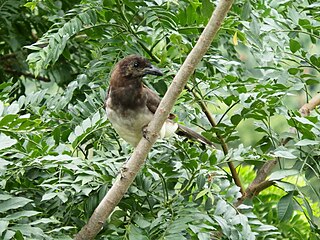
The brown jay is a large jay native to North and Central America.

Anacamptis morio, the green-winged orchid or green-veined orchid, is a flowering plant of the orchid family, Orchidaceae. It usually has purple flowers, and is found in Europe and the Middle East.

The black vine weevil is an insect native to Europe but common in North America as well. It is a pest of many garden plants.

Morio Kita was the pen name of Sokichi Saitō, a Japanese psychiatrist, novelist and essayist.

The chocolate wattled bat is a bat in the family Vespertilionidae. It is found only in Australia, including the island Tasmania, and widespread in southern regions. It is known to reside from sea level to at least 1,570 metres (5,150 ft) in Victoria.
The Cameroon soft-furred mouse or Cameroon praomys is a species of rodent in the family Muridae. It is found in Cameroon and Equatorial Guinea. Its natural habitat is subtropical or tropical moist montane forests. It is threatened by habitat loss.

The Mount Cameroon forest shrew or arrogant shrew, is a species of mammal in the family Soricidae endemic to Cameroon. Its natural habitat is subtropical or tropical moist montane forests.

Otiorhynchus is a large genus of weevils in the family Curculionidae. Many species of the genus, particularly the black vine weevil and the strawberry root weevil, are important pests, both as larvae and as adults. Larvae feed on plant roots. Adults are flightless with fused elytra and feed at night on plant foliage. In many species of the genus at least some races are polyploid and parthenogenetic, while the rest of the races and species are diploid and bisexual. Otiorhynchus weevils, particularly O. scaber, have been a popular subject for studies of the evolution of parthenogenesis. The genus is native to the Palearctic region. However, sixteen species were inadvertently introduced to North America and have become widespread there.
A number of karate techniques are used to deliver strikes to the human body. These techniques are delivered from a number of stances. The karateka uses a number of blocks to protect themselves against these strikes.

Otiorhynchus armadillo is a species of broad-nosed weevil belonging to the family Curculionidae, subfamily Entiminae.

Otiorhynchus rhacusensis is a species in the weevil family (Curculionidae).

Otiorhynchus singularis is a species of weevil native to Europe.

Otiorhynchus meridionalis, the lilac root weevil, is a species of broad-nosed weevil in the family Curculionidae. It is found in North America. Lilac root weevils are shiny, brownish-black beetles, about 0.25 inches (0.6 cm) with long snout (rostrum) and geniculate (elbowed) antennae. They are common landscape pests, feeding on lilac, euonymous and peonies.

Otiorhynchus crataegi, the privet weevil, is a species of broad-nosed weevil in the beetle family Curculionidae.

Otiorhynchus raucus is a species of broad-nosed weevil in the beetle family Curculionidae. It is found in North America.
Otiorhynchus ligneus is a species of broad-nosed weevil in the beetle family Curculionidae. It is found in North America.
Otiorhynchus porcatus is a species of broad-nosed weevil in the beetle family Curculionidae. It is found in North America.

Otiorhynchus rugosostriatus, known generally as the rough strawberry root weevil or rough strawberry weevil, is a species of broad-nosed weevil in the beetle family Curculionidae. It is found in North America.

Otiorhynchus carinatopunctatus is a species of broad-nosed weevil in the beetle family Curculionidae. It is native to Europe and introduced in North America.














